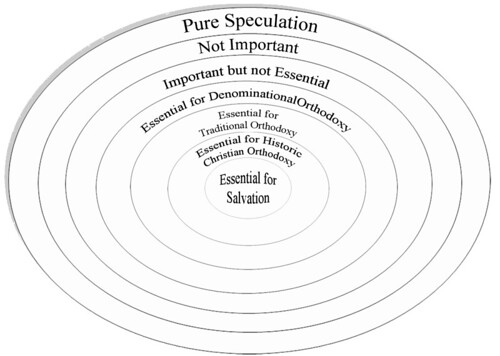
In contrast, Michael Patton's chart, true to his nature, has gotten more complex ... but it's still helpful.

Patton then describes what is essential for salvation:
These are the most essential doctrines of all essentials. This includes what every Christian should always be willing to die for. In essence, if someone does not believe the doctrines that are “essential for salvation,” they are not saved.
- Belief in God (there is no such thing as an atheistic Christian)
Issues pertaining to the person and work of Christ:
- Belief in Christ’s deity and humanity (1 John 4:2-3; Rom. 10:9)
- Belief that you are a sinner in need of God’s mercy (1 John 1:10)
- Belief that Christ died on the cross and rose bodily from the grave (1 Cor 15:3-4)
- Belief that faith in Christ is necessary (John 3:16)
As with all of them, I am sure that there are some ancillary matters that could be included, but this gives you the key doctrines. Without these, you simply don’t have any sense of what it means to be a Christian present.
Then he discusses what is essential for historic Christian orthodoxy:
These include beliefs “essential for salvation” but are broader in that they express what has been believed by the historic Christian church for the last two thousand years, no matter what tradition. This is expressed by the Vincentian Canon (434 A.D.): “that which has been believed everywhere, always and by all.” The exception of fringe movements has never been valid for this canon. It is simply asking, “What have all Christians everywhere always believed?”
- The doctrine of the Trinity as expressed at Nicea
- The doctrine of the Hypostatic Union (Christ is fully man and fully God) as expressed at Chalcedon
- The belief in the future second coming of Christ
- A belief in the inspiration and authority of Scripture
- A belief in eternal punishment for the wicked
- A belief in God’s timeless existence
- Belief that Christ is the only way to the Father
Then comes what is essential for traditional orthodoxy:
Again, these will necessarily include all of those from the two previous categories, but add some distinctives of their own. Essentials here will include all of those that are foundational to one of the three main Christian traditions: Protestantism, Eastern Orthodoxy, and Roman Catholicism. These are beliefs that distinguish one tradition from the next, but are not absolutely essential from the broader Christian worldview expressed above.
Some Protestant distinctives would include:
- General belief in the major pronouncements of the first seven ecumenical councils (325-787 AD)
- Belief in the necessity for a personal relationship with Jesus Christ
- Belief that justification is through faith alone on the basis of Christ alone
- Belief that Scripture alone has ultimate authority on all matters of faith and practice
- The canon of Scripture made up of 66 books (excluding the Deuterocanonical books)
Some Roman Catholic distinctives that would include:
- Belief in transubstantiation (the bread and wine turn into the actual body and blood of Christ)
- Belief that justification is through faith and works
- Belief that both Scripture and unwritten tradition have ultimate authority as they are interpreted by the Magisterium
- Belief in the authority of twenty-one ecumenical councils
- Belief that the Pope is the infallible vicar of Christ
- Belief in the Marian dogmas
- Belief that the canon includes the Deuterocanonical books
Some Eastern Orthodox distinctives that would include:
- Belief in the infallibility of the first seven ecumenical councils (325-787 AD)
- Belief that the liturgy of the Church is part of the Gospel
- Rejection of substitutionary atonement and the imputation of Adam’s sin
- Salvation by grace through faith as God works these out through our unification with Him (theosis)
- Traditional inclusion of the Deuterocanonical book (although there is some debate about this)
Then essential for denominational orthodoxy and so on ...

2 comments:
A couple of comments from the Peanut Gallery, if that's OK:
I. "Belief in God" is awfully vague, don't you think? He needs to define his terms:
1. Does believing that God exists, but only in minds of believers count as Belief? Probably not: this needs to be clarified.
2. What counts as God? Do things like The Force, The Universe, or Myself (hello Shirley McClain) qualify?
II. "Believe that faith in Christ is necessary." seems odd to me. Isn't it more important to have faith in Christ than to believe that said faith is necessary? What happens to people who have one but not the other (for example, someone who has faith in Christ, but doesn't believe that it is necessary; or conversely someone who believes that faith in Christ is neccessary, but has no faith)?
Thanks - yes, it's not so simple ... and yet somehow it is :)
Post a Comment